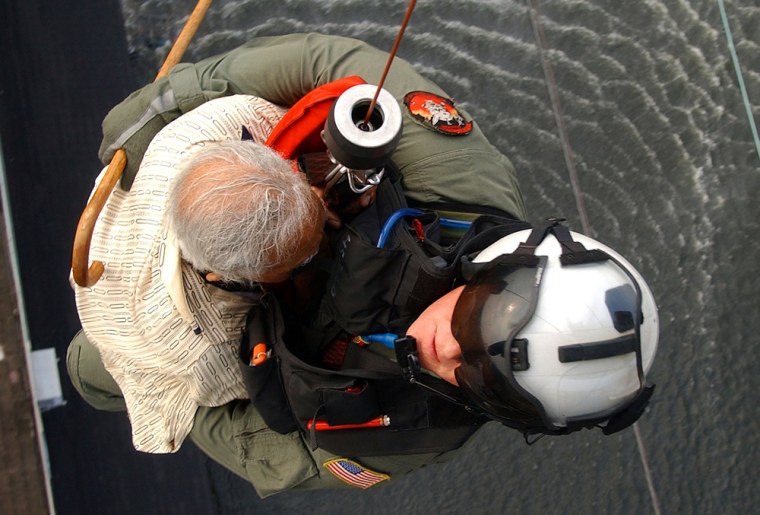“The era of big government is over,” President Bill Clinton declared nine years ago in his State of the Union address in the wake of the Republican takeover of Congress.
On Tuesday as members of Congress began to grapple with colossal cost of aiding people displaced by hurricane Katrina, Sen. Hillary Clinton, D-N.Y. and some of her colleagues in both parties said that the federal government would need to take on immense new responsibilities:
- Medicaid health insurance for many, if not most, of the low-income people who had been evacuated from New Orleans and other Gulf Coast locales. “That’s going to strap a lot of states, including my own,” Clinton said.
- Federal reimbursement to cities and states which have taken in people from the hurricane-devastated areas.
- New federal grants to build housing for low-income people, an idea mentioned by Sen. Mel Martinez, R-Fla.
- Extra social services, mental health services and grief counseling for people displaced from the Gulf Coast.
The net effect of Katrina will be to significantly increase domestic spending.
Senate Democratic leader Harry Reid, D-Nev., said the cost for taxpayer may exceed $150 billion — which would be about a six percent increase on top of current annual outlays of about $2.5 trillion.
“When I was with the governor of Texas yesterday he made it clear they’ve got 250,000 people (from hurricane-hit areas) — they can’t take any more,” Clinton told reporters Tuesday. “They’re looking for some help to deal with what they’re confronting. I’m sure that’s going to be true for all the states.”
Telethons and concerts won't suffice
“You can’t do this strictly on telethons and concerts, as wonderful as they are,” said Sen. Barbara Mikulski, D-Md.
The question raised by all this new domestic spending: Will the hurricane mark a historic turning away in congressional support for overseas commitments such as Iraq and Afghanistan?
Clinton has been a supporter of the Iraq war and the overthrow of the Taliban in Afghanistan.
But in contrast to what many of her Senate colleagues were saying Tuesday, Clinton indicated she thought Katrina might require what used to be called “an agonizing re-appraisal” of overseas commitments.
“I don’t believe we are putting the American people first in this country,” she said. “I don’t know that we can do that unless we have a more sensible policy that looks at the tax cuts for wealthy people that the administration seems determined to enshrine in permanency and the additional tax cuts and spending cuts the administration wants. We have to look at all of our spending. I don’t see how we can be expected to cut $10 billion out of Medicaid.”
She framed the question as “what do we need to do on behalf of the American people,” putting emphasis on the word “American.”
What about Iraq?
When this reporter pressed Clinton specifically on spending for Iraq, she replied, “We need to look at everything, we need to look at everything.”
Voicing a contrasting view was Sen. Joe Lieberman, D-Conn., who like Clinton voted for the Iraq war and the continued funding of it.
“We’re a great nation,” said Lieberman. “There’s no nation in the world that has the combination of economic strength, military strength, and values strength, as the United States of America. We can and will both protect our nation from terrorists and dictators like Saddam Hussein abroad, and protect our people from natural disasters at home.”
He added, “I continue to feel very strongly we have to bring Iraq to a point of success, of victory, of self-sustainability by the Iraqis before we think about departing. The problems associated with the federal government’s response to hurricane Katrina don’t have anything to do with our presence in Iraq."
Lieberman put the numbers in perspective: "Remember, we’ve got 1.4 million active duty soldiers, over a million Reserve and Guard. There are 138,000 or 140,000 in Iraq. As you see now, there are plenty of non-Iraq-based military personnel going to the Gulf coast. The question is should they have come in earlier?”
DeLay's assessment
House Majority Leader Tom DeLay, R-Texas, scoffed at the idea that America would turn away from overseas commitments. “Those people that were against the war on terror to begin with, certainly we’re hearing from them," he said.
Using language similar to Lieberman's he added, "This country is great enough to be able to do that (fight in Iraq) and take care of the needs of the people back home…. We can not give up on that war on terror and at the same time we can handle these kinds of disasters.”
So how will Congress pay for the new spending needs due to Katrina? Part of Clinton’s answer was to raise taxes. “We should be prepared to ask for sacrifice particularly from the richest people in America,” she argued.
But DeLay rejected any such notion. “The worst thing we could do in response to a recovery like this is to attack the economy,” he told reporters. “The worst thing we could do… is a windfall profits tax on the oil corporations, so that they won’t have the money to reinvest in developing more oil and more gas. The worst thing we could do is to increase taxes on the economy, an economy that now has to be a major part of the recovery.”
Some congressional Republicans indicated the hurricane recovery may point to an “era of smaller government” — requiring a suspension of regulations that slow down re-building of highways and more urgently needed gasoline refineries.
Sen. Trent Lott, R-Miss., said California waived environmental and other regulations to speed rebuilding of its interstate highways after the 1990 earthquake and suggested that Gulf Coast states might need to do likewise. And to help ease gasoline shortages, Sen. George Allen, R-Va. argued for a drastic simplification of federal rules that mandate different blends of gasoline in different regions of the nation.
